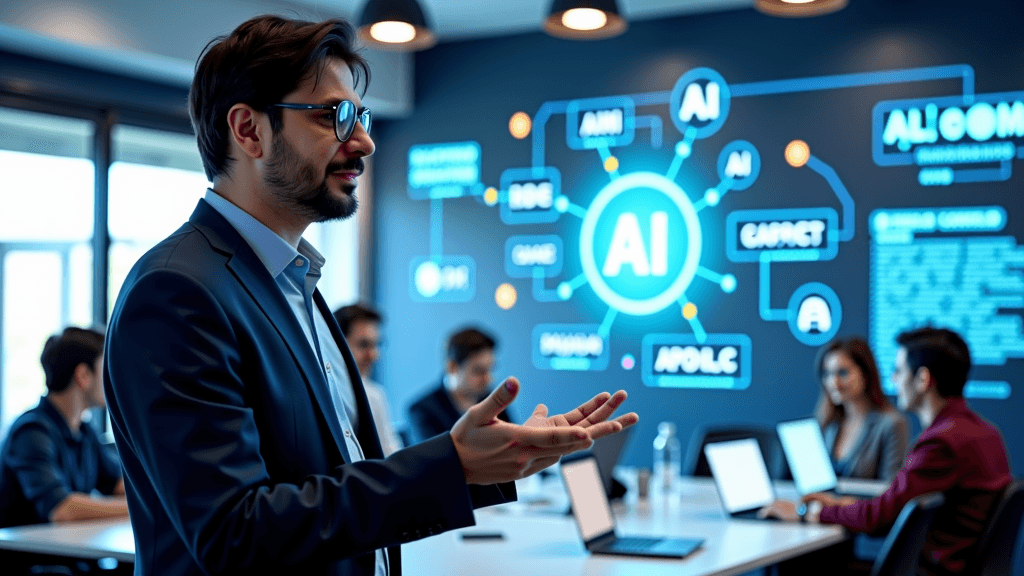AI 2035: Between Mass Replacement and Social Transformation – What Bill Gates and Other Experts Predict for the Future of Work
April 19, 2025 | by Matos AI

The artificial intelligence scene continues to be in turmoil, with new predictions, products and alerts emerging daily. The last 24 hours have been particularly intense, with statements from Bill Gates about the future of work and new studies pointing to profound changes in our relationship with technology. Let's analyze what's happening and what it means for Brazilian professionals and companies.
Bill Gates and the 20-year horizon for mass replacement
Microsoft co-founder Bill Gates set a timeline for the radical transformation of work: within 20 years. According to recent statements, Gates predicts massive automation of tasks currently performed by humans.
What’s most interesting is that, unlike the alarmist tone we usually see, Gates adopts an optimistic perspective. His vision suggests that this revolution will make it possible to overcome the shortage of skilled labor in crucial sectors.
Join my WhatsApp groups! Daily updates with the most relevant news in the AI world and a vibrant community!
- AI for Business: focused on business and strategy.
- AI Builders: with a more technical and hands-on approach.
This two-decade forecast gives us a more realistic timeline than many alarmists who talk about “years” for a massive replacement. It’s also less conservative than estimates that put the horizon at half a century. Gates’s timeline seems reasonable and, in my experience working with tech startups, quite plausible.
Human behavior and relationships reshaped by AI by 2035
One new comprehensive report suggests that artificial intelligence will fundamentally transform cognitive development and social relationships in the next decade. The study points to a consensus among scientists that enormous changes in human behavior and capabilities will occur by 2035.
What strikes me is the concern of half of the experts consulted about a possible decrease in the willingness and ability to reflect deeply on complex issues. We are talking about the erosion of essential cognitive functions — something we have already observed on a smaller scale with the dependence on GPS for navigation or calculators for basic mathematical operations.
Beyond cognitive abilities, the report warns of the replacement of human interactions by synthetic companions. This is a phenomenon that we have already observed in early stages with virtual assistants like Alexa and Siri, but which could intensify dramatically with more advanced AIs.
The good news is that the study also suggests that, if regulated ethically, AI can enhance human capabilities. This is where I believe we should focus our energies: not on how to stop technological evolution, but on how to direct it to enhance our most human abilities.
Professions with their days numbered? Silicon Valley's warning
Victor Lazarte, Benchmark investor, made a specific warning about two professions that he considers particularly threatened: lawyers and recruiters.
The reasoning is simple: AI can perform repetitive tasks in both areas with much greater efficiency. In law, we already see tools capable of analyzing contracts, drafting petitions and conducting case law research in seconds. In recruitment, algorithms can filter resumes, perform initial screenings and even conduct initial interviews with candidates.
However, my view is slightly more nuanced. What I see is not the end of these professions, but a profound transformation. Lawyers who master AI tools and know how to add value in aspects that require contextual understanding, empathy and creativity will continue to be relevant. Likewise, recruiters who use technology to focus on the human aspect of the selection process will find their place.
The challenge is to adapt and reposition yourself. In my work with startups, I often advise entrepreneurs to think not just about how their technology can replace jobs, but how it can enhance unique human capabilities.
Geopolitics of AI: US at risk from Trump's policies?
An often overlooked aspect of AI discussions is the geopolitical component. Recent news point out that President Trump's tariff policies could threaten America's ambition to dominate the race for global AI development.
Tech industry professionals warn that the tariffs could increase the costs of building semiconductor factories in the US, hurting companies like OpenAI, Google and Microsoft as they compete with China.
This is a clear example of how national trade policies can have profound impacts on global technological development. For Brazil, this represents both risks and opportunities. On the one hand, the US-China dispute could make access to advanced technologies more expensive or restricted. On the other hand, it opens up space for countries like ours to develop local alternatives.
Let us remember that Brazil already has a prominent position in Latin America when it comes to AI startups, as we see with the case of iFood, which confirmed that it is testing OpenAI's new GPT 4.1 model. This type of pioneering spirit must be encouraged and expanded.
OpenAI democratizes access to AI with cheaper processing
In a strategic move to democratize access to AI, OpenAI launched Flex processing, an option that offers lower prices for using AI, accepting slower processing in return.
This is particularly important news for Brazilian developers, startups, researchers, and small businesses. Reducing API costs makes it more affordable to implement advanced AI solutions, allowing entrepreneurs with limited resources to compete with larger companies.
In my mentoring work with startups, I often see promising projects shelved due to the high costs of AI processing. Initiatives like this one from OpenAI can be the difference between an idea that stays on paper and one that becomes a viable product.
AI in your pocket: what's new in smartphones
The past 24 hours have also brought news about how AI is coming to consumer devices. Samsung launched the Galaxy A56, a premium mid-ranger with a focus on AI features like text extraction and image editing.
On Apple's side, the Apple Intelligence comes to iPhone with the iOS 18.4 update, bringing custom emoji creation, photo search optimization and automatic video generation.
These launches demonstrate how AI is quickly becoming a core feature in consumer products, not just advanced enterprise applications. It’s the democratization of technology happening before our eyes.
The Dark Side: When AI Gets It Wrong and Trust Is Shaken
Not everything is rosy in the world of artificial intelligence. One incident with Cursor auto support generated intrigue among users after the AI created a fake policy.
This case highlights a fundamental issue: the reliability of AI and the risks of its application in critical contexts. The company’s delay in responding officially to the issue led to subscription cancellations, showing how failures in the application of AI can have direct business impacts.
The incident serves as a reminder that despite all the advances, AI still has significant limitations, especially when it comes to understanding contextual and ethical nuances. For companies implementing these solutions, it’s crucial to have clear protocols in place for when the technology fails.
UK enters race for AI empire
THE Stargate Project aims to transform the UK into a global computing hub for AI models, facilitating access to the energy needed for large-scale AI operations.
This British move is a response to significant US investment in the sector, and demonstrates how the race for leadership in AI has taken on truly global proportions.
For Brazil, this raises important questions: what is our role in this race? How can we leverage our competitive advantages (such as a diversified energy matrix, technical talent and significant market) to position ourselves as relevant players?
What this all means for you and your business
Analyzing the panorama of the last 24 hours, it is clear that we are living in a moment of acceleration in the transformations caused by AI. Bill Gates' 20-year forecast and the study pointing to profound changes by 2035 converge on one scenario: we have a window of time to adapt, but this window is not as large as many would like.
For professionals, the message is straightforward: invest in developing skills that complement AI, not compete with it. Creativity, critical thinking, emotional intelligence, and the ability to solve complex problems are skills that will continue to be valuable.
For Brazilian companies, the message is twofold:
- On the one hand, it is urgent to incorporate AI into processes and products so as not to be left behind. OpenAI’s Flex model makes this more accessible for businesses of all sizes.
- On the other hand, it is essential to adopt these technologies critically and strategically, considering both their capabilities and limitations.
In my mentoring work with startups and companies, I have observed that the most successful entrepreneurs are not those who simply adopt AI because it is fashionable, but those who are able to integrate it into a clear strategic vision, solving real problems in an innovative way.
Conclusion: Brazil at the crossroads of AI
The news of the last 24 hours illustrates what I have been saying for years: we are facing an unprecedented technological transformation that will fundamentally change how we live, work and relate to each other.
Brazil has all the conditions to position itself as a protagonist in this new era, but this will require strategic vision, consistent investments and an approach that balances innovation with ethical responsibility.
In my mentoring for startups and consulting for companies, I have helped entrepreneurs navigate this new scenario, identifying unique opportunities that AI offers for the Brazilian market. The key is to develop solutions that not only incorporate the latest technologies, but that do so in a way that solves real problems and generates sustainable value.
The future belongs to those who can balance their enthusiasm for technology with a deep understanding of fundamental human needs. It is in this balance that the greatest opportunities lie.
✨Did you like it? You can sign up to receive 10K Digital's newsletters in your email, curated by me, with the best content about AI and business.
➡️ Join the 10K Community here
RELATED POSTS
View all



